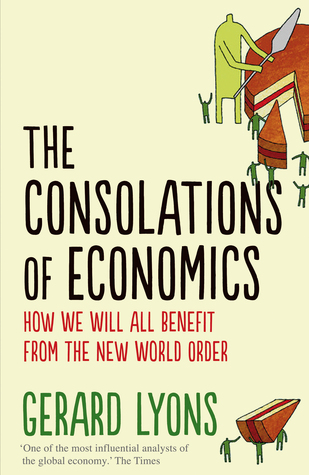Randomly picked this book up at the National Library because *ECONOMICS*. I really wonder what people think of my borrowing history, it's like 9 comics (me and my bro), then one "Consolation of Economics".
Anyway, this book is supposed to be a "lucid and accessible expert's attempt to look objectively at the changing global economy." So my review will focus on how "accessible" and "lucid" it is, not on how sound the economics is (I shall leave that to the experts, because I can't find any obvious problems here).
I must say, the book is surprisingly readable. I would think that as long as you've taken an introductory economics course, you will be able to understand what the author is talking about. Terms like "nominal" and "inflation" do appear, hence the "introductory knowledge needed" thing I just said. The author does a good job of explaining new terms too, like when he talks about soft power (he uses a slightly different definition than the norm).
As for how international the book is - well, it's complicated. The book clearly looks at the global economy - China and India (particularly China) are discussed in depth, and Japan is talked about many times as well. Even Singapore made its fair share of appearances (way more than I was expecting). But, since this book is orientated towards readers in the Western economies (it is about how the shift of power to the East isn't necessarily detrimental to the West after all), there is slightly more focus on the UK, EU and the US.
The book itself is divided into 9 parts, and includes: a brief history of economics, China's economy, the 2008 Financial crisis, the Ukraine crisis, the G7 and the G20, and lots more. You'd notice that the book is very very current, since it was published this year. I dare say that in a year or two, when some of the current crisis have played out, the book might not be as relevant, but for now, this is one of the most accessible books on modern economics that I've read.
My favourite part of the book was, surprisingly, the last chapter, which looks at the future of economics. It references something that I learnt last semester, that younger economics prefer Game Theory, but older economists look at things like unemployment, fiscal policy, etc. So to read about Mr. Lyons' opinion was really interesting to me.
All in all, this is an excellent and accessible book. Read it now (in 2014), because it contains information about current events. A year or two down the line, and a new edition might be in order, so get your hands on it quick.
Monday, November 17, 2014
Subscribe to:
Post Comments
(
Atom
)


No comments :
Post a Comment
I really do appreciate all comments, and I'll try my best to reply within 24 hours!
^_^